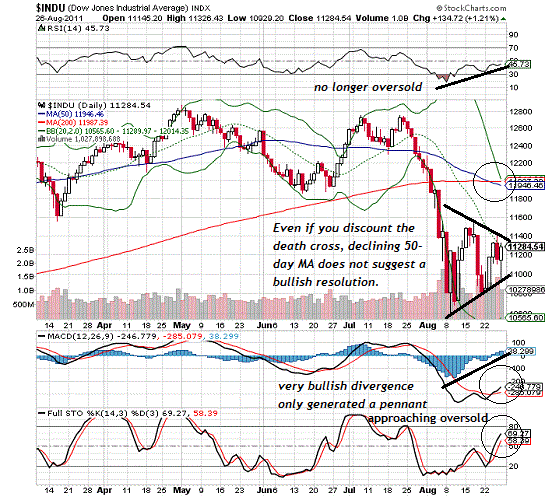Preparing For Sunday
With just a little over 24 hours to go until the Globex
re-opens, I thought I would chime in with what I expect tomorrow night.
Many are concerned that current circumstances in gold resemble silver
from the first weekend of May. If you're not sleeping well out of
concern for tomorrow, I'm here to put you at ease. Read more...
Guest Post: Storm Pennants Are Flying In Stocks And The Dollar

The stock market is wearing a T-shirt that reads, "I broke a downtrend and all I got was this lousy pennant." Having just returned from nine glorious days camping in Washington State, I have no idea what "news" has effected the markets ("news" in quotes because the news is managed for its PR effect--the real news is what has been suppressed lest it undermine the Status Quo's carefully cultivated propaganda campaign), and so I have marked up the chart of the Dow Jones Industrial Average (DJIA) and the U.S. dollar without the "benefit" of the news flow. What pops out is a big fat pennant in both charts. Pennants can be continuation patterns--mere way points in a continuing up or down trend--or they can indicate points of trend reversals. The key feature of a pennant is the compression of price into a narrowing channel, as the relative indecision of buyers and sellers alike causes price to fluctuate less and less.
Wikileaks Reveals Early Chinese Warning Of Domestic Asset Bubbles, Overcapacity, Bashing Of "Copy And Paste" Educational System
Wikileaks' threat to expose Bank of America came and went, and yet all it took for the bank to implode was reality, a little time, and an independent media. That said, Wikileaks has not yet been completely relegated to the compost heap of one time fads. In a blast submission of several thousand cables, Julian Assange tries to regain his one time star status. While we have to go through the bulk, one that caught our attention was a cable from the US delegation in Chengdu, China, where a counsel met with a local representative of the World Bank's International Finance Corporation, for some candid one on one. While the bulk of the exposition, which took place in December of 2009, is not surprising, there are some frank admissions about the emergence of a Chinese bubble, long before the topic was mainstream (and only fringe investors would consider it), observation that urban housing prices are "here to stay for the coming few years as they are an unavoidable, long-term aspect of the nationwide, structural shift in the population from rural area to urban centers", the realization that the solar industry is plagued by overcapacity and due for a restructuring (many "solar" longs would have been delighted to know this well in advance of the recent decimation in the Chinese solar stock space), but most notable is the Chinese admission that "China will remain a "poor country" for years to come, and can expect to emerge as a "respectable mid-level" country only in another 10-20 years" in order to grow its service sector from the current 30-40% of the economy to a US-comparable 75%, many structural shifts will have to take place. And while such shifts "are already happening to some extent in places like the Pearl River Delta", and "Chinese companies increasingly setting up factories overseas" the biggest impediment is China's "terrible educational system" which "promotes copying and pasting over creative and independent thought." Explaining further, "the normal process undertaken by students when writing as essentially collecting sentences from various sources without any original thinking. He compared the writing ability of a typical Chinese Phd as paling in comparison to his "unskilled" staff during his decade of work with the IFC in Africa." Well, if China's education system is worse than that of the US, we can probable stop worrying about the dollar relinquishing its reserve status. On the other hand, we would be the first to point out that China, which does not admit defeat, is probably in the early stages of the next bubble: that of importing teachers, educators, professors and generally Ivy League Ph.D.'s. Which is great: take as many as you want. The average tenured Ivy League (not to mention MIT and NYU) professor has already done enough damage to the US - it is only fair that they destroy China next.Podcasting The Charts That Matter Next Week: The Continuing Case For A Weaker EUR

Over the past x months, one thing has become all too clear in FX land: the EURUSD must stay rangebound between 1.40 and 1.50, even though as Goldman's John Noyce presents in his latest "not-for-retail" packet, the fair value of the European currency continues to be higher than where it should be. Whether this is a simple case of the tail wagging the dog, whereby the ECB and China are terrified of the downstream effects should the European currency trade under the psychological barrier of 1.40, is unclear. What is clear is that every country in the world has skin in the game, and is forced to keep the EUR in Goldilock rangebound territory: not too low to spook European investors, and not too high to accelerate the German double dip. Some other risk assets correlations observed include the AUD vs 2 year swap spread basket, the VIX vs the S&P, and lastly, on the until recently massively overstretched CHF. Noyce tops it off with some technical perspectives on US govvies and the 2s10s, which is once again diving, although unclear if due to a bullish or bearish flattening.
![[Most Recent Quotes from www.kitco.com]](http://www.kitconet.com/charts/metals/gold/t24_au_en_usoz_2.gif)
![[Most Recent Quotes from www.kitco.com]](http://www.kitconet.com/charts/metals/silver/t24_ag_en_usoz_2.gif)
No comments:
Post a Comment